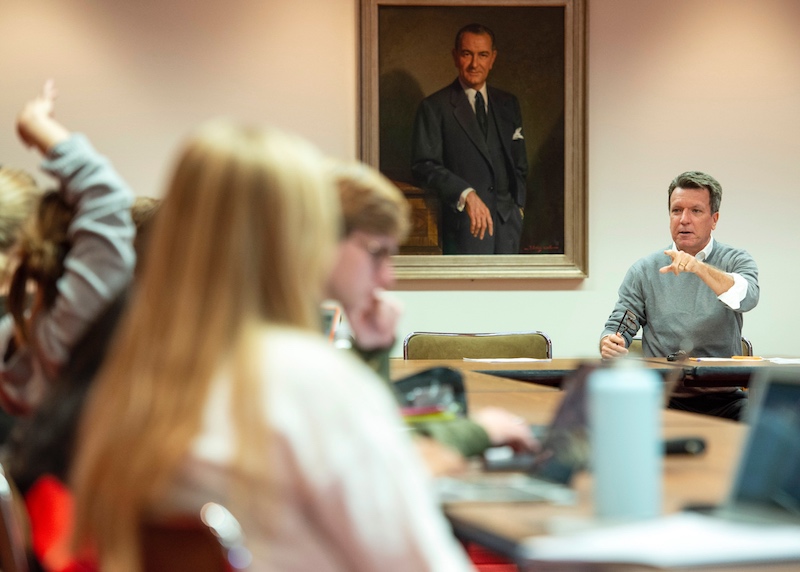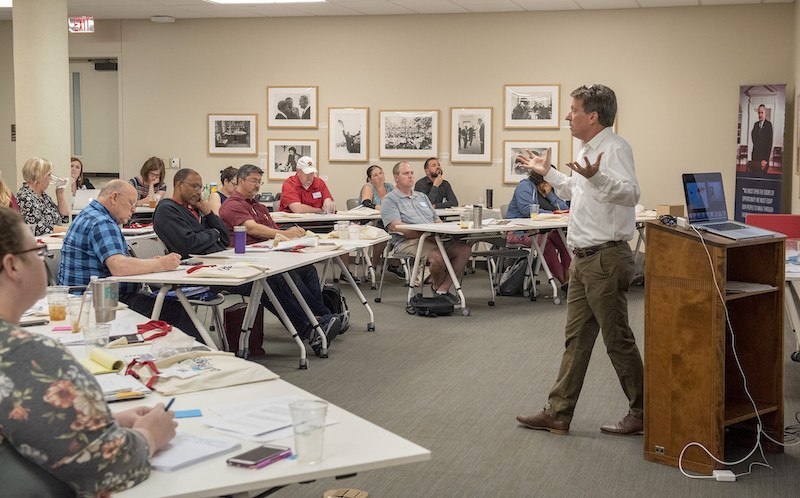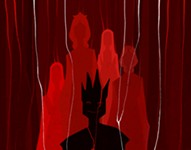LBJ Library at 50: An Interview With Mark A. Lawrence
The Library's current director takes a historian's view
By Robert Faires, 12:01AM, Thu. Aug. 26, 2021
Mark A. Lawrence barely had a moment to enjoy being the new director of the LBJ Presidential Library before COVID came calling. His first day on the job was Jan. 5, 2020, and the Library closed March 13. In the 17 months since, he still hasn’t had a chance to relish the role publicly – even on the 50th anniversary of the Library’s dedication in May.
What might have been an opportunity for a grand celebration with guests galore and Lawrence playing host was negated by ongoing concerns about the coronavirus.

But that doesn’t mean Lawrence hasn’t been busy. The Library commemorated its 50th in a different way: by rolling out a new website devoted to telephone conversations recorded by LBJ during his years in the White House. Developed by the Library in partnership with the Miller Center for Public Affairs at the University of Virginia, the site lets visitors listen to calls in which the President spoke to Martin Luther King Jr., J. Edgar Hoover, Richard Nixon, Edward Kennedy, Hubert Humphrey, and other national and international figures about important events of the times: the passage of the Civil Rights and Voting Rights Acts, the War on Poverty, rioting in Watts, the assassination of Bobby Kennedy, and, naturally, the Vietnam War.
As a way to mark the Library’s half-century milestone, that may actually be more suited to the current director. Lawrence is a historian whose focus is on international affairs in the 1950s and 1960s, with a special interest in Vietnam. (He has authored the award-winning Assuming the Burden: Europe and the American Commitment to War in Vietnam and The Vietnam War: A Concise International History. And for several years, he’s taught an undergraduate course called “The Johnson Years,” sometimes co-teaching it with former Library director Mark Updegrove. Something that connects people with history – especially regarding LBJ’s life and times – is what he’s about. That came through clearly in our conversation about the Library and what lies ahead.
Austin Chronicle: What was your view of the LBJ Library when you got here?
Mark Lawrence: When I first came to Austin, I was a newly minted Ph.D, feeling very fortunate to have landed a teaching job at a Research 1 university. At that point, I wasn’t even factoring in the fact that there was this presidential library on campus. I knew of course that it was here and figured that, given my interest in the Vietnam War, it probably would have some importance for me. My dissertation and first book was really situated in the Truman period, so there wasn’t a direct connection, but it had to do with Vietnam so that was a very direct connection to this place. Then there were a couple of faculty members in the History department who had served on committees over here and knew Harry Middleton [the Library’s director from 1971-2001], and they were very helpful in putting me in touch with Harry and showing me a little bit behind the scenes. Long story short, over the next almost 20 years, I did a lot of research, I served on committees, I got to know staff, I taught a class starting in 2014, sometimes with Mark Updegrove [the Library’s director from 2009-17], sometimes by myself, called “The Johnson Years,” which was a big success, and just came to lots of events and occasionally got invited to dinners and conferences and so forth. So it was a place I kept coming back to in different ways. [It] became kind of a second home.
AC: You’ve had plenty of time to see the institution evolve. Have there been any changes that struck you as improvements for you as a historian?
ML: To me, releasing [LBJ’s recorded telephone calls] speaks to something I’ve always appreciated about this institution, which is the dedication to openness, the eagerness to work with researchers and to help them find what they’re looking for, to declassify, to project an image of openness. Which I think this place has a reputation for – and honestly, I think it’s well-deserved. I thought that when I was a historian using this place as an outsider, but I really feel that having seen it from the inside. I suppose that’s not something that’s changed because it’s been pretty constant. That continual dedication to openness doesn’t come naturally; it has to be sort of rethought, there has to be a rededication to it all the time. The leadership here has always prioritized that.
AC: Is that a standard you really want to uphold as director?
ML: Definitely. Of course, there’s still material to be processed, and I don’t want to –
AC: Really? Out of 45 million documents?
ML: [Laughs] We’re probably a little behind where we should be. In part, it’s because the collection has grown over the years, so it’s a constantly moving target. The challenge of keeping that dedication to openness going in the future is taking a different form in the electronic age. What it really means now is digitization. It means getting our material out to a wider community, to folks who may never set a foot in this building. That’s an important adjustment.
Honestly, that’s not my strong suit. I’ve never been a super high tech person. But I am 100% comfortable with the idea that this is where the biggest impact can be made in terms of delivering what, at the most basic level, this institution is all about: letting people see the record of their government. You know, you used to have to come here and sit in the research room, and that’s fine and we want to keep that going, but we [also] want to digitize our holdings and make them accessible to the researcher in Sweden or India or wherever. That’s one of the places where I’d really like to put the emphasis in the years ahead. And there’s a lot of interest in the National Archives in that as well – not always the resources but definitely the interest.

AC: Thinking about your courses on “The Johnson Years” and doing the math, we’re into a generation for whom LBJ is a distant figure from the past, someone who died long before they were born. What impressions of him do you find students have?
ML: That’s a fantastic question, and it speaks to another challenge of this institution, which is keeping LBJ relevant and interesting for people who don’t have those direct connections to the period. In the classes that I’ve taught, what I’ve noticed is – unsurprisingly – students adopt the opinions of their parents, or now very often their grandparents, who are the people who actually lived through the Johnson presidency. Also unsurprisingly, opinions vary. Enormously. As much as I would guess of any politician in recent history – maybe all of American history. The controversies of the 1960s are still alive and well, and [so are] the attitudes that people hold [about them].
AC: And in many instances, the issues that generated those opinions or the strongest protests were not resolved in that decade, and to a great extent are not resolved to this day: Vietnam, civil rights, the war on poverty – these things that generated so much passion and division, they’re still out there. So the students come into your class having identified with their elders’ opinions. Are you able to open their minds to a more complex view?
ML: Yes, I think that we – speaking of Mark and me – generally succeed in opening students’ minds to a more complicated LBJ. Fortunately, LBJ gives you so much to work with. He was the great hero of civil rights and poverty and all the issues that most students who come to us are very interested in and sympathetic to. But he’s also the president of Vietnam. He’s also kind of boorish in his personal behavior. You can highlight the dimensions of his life and career that suggest a different LBJ. I think everyone comes away recognizing that this was an enormously complicated figure. I don’t know who it was that said that every adjective in the dictionary applies to LBJ, but that’s probably right.
AC: As someone who has largely known the Library as a museumgoer, I’ve felt through the years that the ideas of transparency and openness extend to the way the Library tells LBJ’s story. There’s been less and less of an attempt to shy away from the complexity – and even the negative aspects of who he is and what he did. Have you had that impression?
ML: I do think that. I’m delighted that you have that impression, and maybe others do as well. That’s certainly something I feel strongly about as a historian, and my interest in this position has to do fundamentally with a keen interest in the 1960s and this enormously complicated person. One of the things I like about LBJ is that he and his presidency raised so many questions that are still so relevant to the 21st century. But I get a little bit less comfortable when people assume the LBJ Library is there to glorify LBJ or be a shrine to his memory.
AC: For better or worse, it looks like this enormous mausoleum. I can appreciate the architectural design, but there is an aspect to it that feels like it’s elevating LBJ to something like a pharaoh. So it’s been remarkable to see the institution, as it has evolved, not deny the beauty of the building but to say, “We’re gonna tell you a human story.”
ML: “With the bark off.” [Laughter] I’d be delighted if I thought that people went through our museum and were provoked and challenged by it, and maybe became more familiar with some of the more positive aspects of the Johnson administration that they weren’t familiar with before. That they thought more that they had been provoked and challenged rather than sold a particular kind of heroic version of LBJ. I do think we do a good job of that. But the bar, honestly, may not be that high. You know, many presidential libraries do have that sense of being a shrine, and that I suppose is understandable, in particular, with the more recent ones where there’s a living president and there isn’t that same passage of time to give you some perspective. But I think as one of the older presidential libraries, we’re in a strong position to be constantly rethinking the history of the period and adapting our museum to the tastes and interests of young people, and also benefiting from the greater historical perspective in painting the picture in the right way, and a lot of times I think that means more complicated ways.

AC: I’ve been so impressed by the programming that the library has done, which hasn’t been simply looking backward but giving the public a forum for discussing major issues. From an institutional standpoint, that’s an important mission and not something undertaken lightly. What were your feelings about that prior to being director and how do you feel about it now?
ML: I think that was baked into the institution at its inception. I think that LBJ himself, Mrs. Johnson, and others really wanted the LBJ Library to be different from the existing presidential libraries. At the time, I think there were only three: FDR, Truman, and Eisenhower – Kennedy’s wasn’t established until the Seventies. And nothing against those institutions, but they were smaller in scale and they were kind of focused on the history of the president. In terms of the scale of this building, you can see that something’s different here.
AC: Welcome to Texas!
ML:[Laughs] Way back at the beginning, there was this idea that the institution could be an archive but it could be much more than that. It could be a stage and a forum for discussion of important public issues and debates. And the LBJ Foundation and a lot of people who had a really strong hand in shaping this institution over the years have consistently been dedicated to that idea that the history is great, and that’s a big reason why we’re here, but we should use that as the foundation to think about the present and the future. I think each of the directors who preceded me had that vision very much in mind – none more so than Mark Updegrove, who is the master of these fantastically successful high-profile events. Probably the single most striking thing about this institution is this series of events and lectures that’s constantly bringing in big names – and not just big names but thoughtful names, provocative names – to speak to gigantic audiences.
Looking forward, the two biggest challenges that I think about are how to make what goes on here accessible to people in the wider world, whether researchers, teachers, students, or museumgoers. That’s a big challenge, and we’re good at that, but we’re not great at that. And the other thing is to constantly be rethinking the history of the 1960s – how to engage people in what I think all of us recognize now is one of the most consequential parts of American history. People may have less experience, less knowledge, so you have to engage them in different ways. It may be that younger generations process information differently, too. So there is this constant challenge to refresh our exhibits and bring them up to date and highlight different things. I tend to think that one of the challenges is to move away a little bit from a blow-by-blow of the Johnson presidency to get people to think more generally about what life was like in the 1960s, what the social problems were, because you can’t assume that anymore. What did poverty feel like? What did segregation feel like? Not to say that people don’t experience those things [today], but the way that those things were experienced in the 1950s and Sixties is an increasingly distant thing. So the burden is a bit heavier on us to situate LBJ within his era. Not to lose sight of his accomplishments but to enable people to see them as fitting within a particular moment in history.
In this week's cover story you can read more about the LBJ Library's five decades of keeping history and making history.
A note to readers: Bold and uncensored, The Austin Chronicle has been Austin’s independent news source for over 40 years, expressing the community’s political and environmental concerns and supporting its active cultural scene. Now more than ever, we need your support to continue supplying Austin with independent, free press. If real news is important to you, please consider making a donation of $5, $10 or whatever you can afford, to help keep our journalism on stands.
Adrienne Hunter, Oct. 18, 2021
Robert Faires, Aug. 27, 2021
Sept. 24, 2021
Sept. 17, 2021
LBJ Library, LBJ Presidential Library, Mark A. Lawrence, Lyndon Johnson, LBJ, Lady Bird Johnson, Harry Middleton, Mark Updegrove, LBJ, Vietnam










